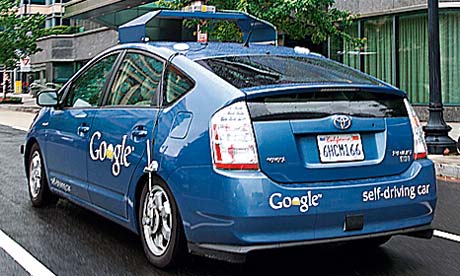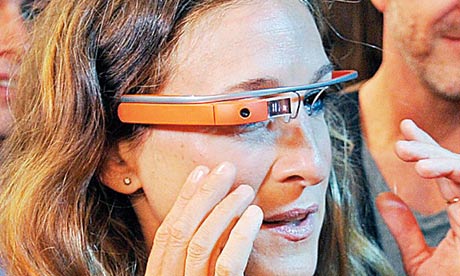Imagine you are an urban professional living in a western city a few decades from now. An average morning might look something like this:
Your apartment is an electronic orchestra and you are the conductor. With simple flicks of the wrist and spoken instructions, you can control temperature, humidity, ambient music and lighting. You are able to skim through the day's news on translucent screens while a freshly cleaned suit is retrieved from your automated closet. You head to the kitchen for breakfast and the translucent news display follows, as a projected hologram hovering just in front of you. You grab a mug of coffee and a fresh pastry, cooked to perfection in your humidity-controlled oven, and skim new emails on a holographic tablet projected in front of you. Your central computer system suggests a list of chores your housekeeping robots should tackle today, all of which you approve.There will be no alarm clock in your wake-up routine – at least, not in the traditional sense. Instead, you'll be roused by the aroma of freshly brewed coffee, by light entering your room as curtains open automatically, and by a gentle back massage administered by your hi-tech bed. You're more likely to awake refreshed, because inside your mattress there's a special sensor that monitors your sleeping rhythms, determining precisely when to wake you so as not to interrupt an REM cycle.
You pull up notes for a presentation you'll give later that day to important new clients abroad. All of your data – from your personal and professional life – is accessible through all of your various devices, as it's stored in the cloud, a remote digital-storage system with near limitless capacity. You own a few different and interchangeable digital devices; one is the size of a tablet, another the size of a pocket watch, while others might be flexible or wearable. All will be lightweight, incredibly fast and will use more powerful processors than anything available today.
 The Google self-driving car makes its way through the streets of in Washington DC in May 2012. According to Google's Eric Schmidt, such cars, and other robots, will be part of everyday life in the not too distant future. Photograph: AFP/Getty Images
The Google self-driving car makes its way through the streets of in Washington DC in May 2012. According to Google's Eric Schmidt, such cars, and other robots, will be part of everyday life in the not too distant future. Photograph: AFP/Getty Images
As you move about your kitchen, you stub your toe, hard, on the edge of a cabinet – ouch! You grab your mobile device and open the diagnostics app. Inside your device there is a tiny microchip that uses low-radiation submillimetre waves to scan your body, like an x-ray. A quick scan reveals that your toe is just bruised, not broken. You decline the invitation to get a second opinion at a nearby doctor's office.
There's a bit of time left before you need to leave for work – which you'll get to by driverless car, of course. Your commute will be as productive or relaxing as you desire.
Before you head out, your device reminds you to buy a gift for your nephew's upcoming birthday. You scan the system's proposed gift ideas, derived from anonymous, aggregated data on other nine-year-old boys with his profile and interests, but none of the suggestions inspires you. Then you remember a story his parents told you that had everyone 40 and older laughing: your nephew hadn't understood a reference to the old excuse "a dog ate my homework"; how could a dog eat his cloud storage drive? You do a quick search for a robotic dog and buy one with a single click. In the card input, you type: "Just in case." It will arrive at his house within a five-minute window of your selected delivery time.
You think about having another cup of coffee, but then a haptic device ("haptic" refers to technology that involves touch and feeling) that is embedded in the heel of your shoe gives you a gentle pinch – a signal that you'll be late for your morning meeting if you linger any longer.
Being able to do more in the virtual world will make the mechanics of our physical world more efficient. As digital connectivity reaches the far corners of the globe, new users will employ it to improve a wide range of inefficient markets, systems and behaviours, in both the most and least advanced societies. The resulting gains in efficiency and productivity will be profound, particularly in developing countries, where technological isolation and bad policies have stymied growth and progress for years.
The accessibility of affordable smart devices, including phones and tablets, will be transformative in these countries. Consider the impact of basic mobile phones for a group of Congolese fisherwomen today. Whereas they used to bring their daily catch to the market and watch it slowly spoil as the day progressed, now they keep it on the line, in the river, and wait for calls from customers. Once an order is placed, a fish is brought out of the water and prepared for the buyer. There is no need for an expensive refrigerator, no need for someone to guard it at night, no danger of spoiled fish losing their value (or poisoning customers) and no unnecessary overfishing. The size of these women's market can even expand as other fishermen in surrounding areas coordinate with them over their own phones. As a substitute for a formal market economy (which would take years to develop), that's not a bad work-around for these women or the community at large.
Mobile phones are transforming how people in the developing world access and use information, and adoption rates are soaring. There are already more than 650m mobile phone users in Africa, and close to 3bn across Asia. The majority of these people are using basic-feature phones – voice calls and text messages only – because the cost of data service in their countries is often prohibitively expensive. This will change and, when it does, the smartphone revolution will profoundly benefit these populations.
What connectivity also brings, beyond mobile phones, is the ability to collect and use data. Data itself is a tool, and in places where unreliable statistics about health, education, economics and the population's needs have stalled growth and development, the chance to gather data effectively is a game-changer. Everyone in society benefits, as governments can better measure the success of their programmes, and media and other nongovernmental organisations can use data to support their work and check facts.
And the developing world will not be left out of the advances in gadgetry and other hi-tech machinery. Even if the prices for sophisticated smartphones and robots remain high, illicit markets such as China's expansive shanzhai network for knock-off consumer electronics will produce and distribute imitations that bridge the gap.
 Google glasses are as nothing compared with what Eric Schmidt predicts for future domestic computers. Photograph: Camera Press
Google glasses are as nothing compared with what Eric Schmidt predicts for future domestic computers. Photograph: Camera Press
In "additive manufacturing", or 3D printing, machines can actually "print" physical objects ultra-thin layer by ultra-thin layer. Communal 3D printers in poor countries would allow people to make whatever tool or item they require from open-source templates. In wealthier countries, 3D printing will be the perfect partner for advanced manufacturing. New materials and products will all be built uniquely to a specification from the internet and on demand by a machine run by a sophisticated, trained operator.
As for life's daily tasks, information systems will free us of many small burdens that today add stress and chip away at our mental focus. Our own neurological limits, which lead us to forgetfulness and oversights, will be supplemented by information systems designed to support our needs. Two such examples are memory prosthetics – calendar reminders and to-do lists – and social prosthetics, which instantly connect you with your friend who has relevant expertise in whatever task you are facing.
By relying on these integrated systems, we'll be able to use our time more effectively each day – whether that means having a "deep think", spending more time preparing for an important presentation or guaranteeing that a parent can attend his or her child's football match without distraction.
Yet despite these advancements, a central and singular caveat exists: the impact of this data revolution will be to strip citizens of much of their control over their personal information in virtual space, and that will have significant consequences in the physical world.
In the future, our identities in everyday life will come to be defined more and more by our virtual activities and associations. Our highly documented pasts will have an impact on our prospects, and our ability to influence and control how we are perceived by others will decrease dramatically. The potential for someone else to access, share or manipulate parts of our online identities will increase, particularly due to our reliance on cloud-based data storage.
The basics of online identity could also change. Some governments will consider it too risky to have thousands of anonymous, untraceable and unverified citizens. Your online identity in the future is unlikely to be a simple Facebook page; instead, it will be a constellation of profiles, from every online activity, that will be verified and perhaps even regulated by the government. Imagine all of your accounts – Facebook, Twitter, Skype, Google+, Netflix, newspaper subscription – linked to an "official profile".
Identity will be the most valuable commodity for citizens in the future, and it will exist primarily online. We will see a proliferation of businesses that cater to privacy and reputation concerns. We will even see the rise of a new black market, where people can buy real or invented identities.
Without question, the increased access to people's lives that the data revolution brings will give some repressive autocracies a dangerous advantage in targeting their citizens. Yet demand for tools and software to help safeguard citizens living under digital repression will give rise to a growing and aggressive industry. And that is the power of this new information revolution: for every negative, there will be a counter-response that has the potential to be a substantial positive. More people will fight for privacy and security than look to restrict it, even in the most repressive parts of the world.
































